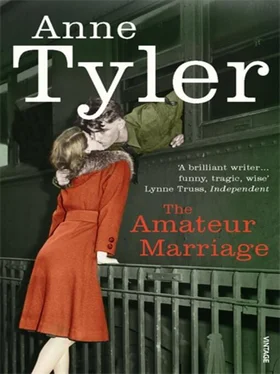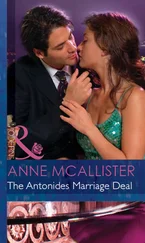Well, that was something else people were growing accustomed to: these intense wartime romances. Three of the Szapp boys had married within a single week! But since Pauline was from away, this meant Michael all but disappeared from view. He spent most of his time at her family’s house. Her family loved him, Wanda reported. They were very doting and welcoming — a household of daughters, four of them, only one as yet married. They cooked for him and made a big fuss whenever he showed up. And Pauline, of course, was in heaven. It was a perfect, blissful five days, by all accounts, and then he shipped out for special training in California. (Was it his gift for reassembling rifles? Some fund of superior intelligence up till now kept hidden?) Mrs. Anton was left looking more bereft than ever. She no longer discussed her plans to fire Eustace.
Mrs. Szapp asked Mrs. Anton if Michael and Pauline were thinking of marriage. This was not very tactful of her. The other customers tensed. But Mrs. Anton surprised them. Yes, she said mildly, he’d said something about it. He said the subject had come up between them. And it was a fact that a Baltimore girl would be preferable to somebody French or English.
Oh, well, of course. Sure couldn’t argue with that, people said, tumbling over each other’s words in their haste to reassure her.
But you never knew, Mrs. Anton went on. There was many a slip betwixt cup and lip. She wasn’t holding her breath.
She brightened as she said this — unbecomingly, some agreed later, discussing it among themselves.
Katie Vilna left the cannery and took a job making airplane parts. The Golka twins journeyed daily to the steel mill out at Sparrows Point. And Wanda Bryk might join the Women’s Army Auxiliary Corps, as soon as they began accepting applications. Should she? Shouldn’t she? she asked, twirling on her stool at the soda fountain. Yes! the other girls told her. Do it! They would join in a flash, if only their parents would let them.
Pauline didn’t come around St. Cassian Street much anymore. She was busy with her volunteer work. The neighborhood girls had their own volunteer work (they must have rolled a million bandages by now, all the while wearing white headdresses that made them look like sphinxes), but Pauline’s sounded more interesting. She was helping out at a Red Cross canteen, Katie said, serving coffee and doughnuts to lonesome soldiers passing through the port. Sometimes Katie helped too. Katie couldn’t count all the fellows she’d met! She said her biggest expense these days was stationery.
A number of the girls asked if they could come with her next time.
In Anton’s Grocery, Mrs. Szapp said, “Where has Pauline got to? Nobody seems to have seen her.”
“Oh, she’s around,” Mrs. Anton said.
“I thought she might have gone off somewhere.”
“She’s around, I tell you! She was in here just… when was it. Just last week, or the week before. Talking on and on about Michael. You know how she talks.”
Mrs. Szapp was quiet a moment, and then she asked how many ration points a pound of sausage would cost her.
The younger of the Piazy boys went down with his ship in the Coral Sea. It was the parish’s first casualty. Mr. Piazy completely stopped speaking. The neighbors walked around for days with pale, tight faces, silently shaking their heads, murmuring phrases of disbelief when they met on the street. So this was for real! they seemed to be saying to each other. Wait a minute! No one had told them things would get so serious!
The Dobeks received a telegram saying Joe was missing in action. Davey Witt was sent home with some kind of nervous trouble that the Witts preferred not to discuss. Jerry Kowalski caught malaria. And Michael Anton was shot in the back and sidelined to the infirmary.
Mrs. Anton said she was glad. She said, “Every day he spends lying in that hospital bed is a day he’s not overseas getting killed.” Nobody could blame her.
Pauline got more letters than ever, now, and already she had three shoeboxes full. She kept referring to Michael’s having been “wounded.” And of course, he had been wounded, but only by mistake. Some stupid, careless mistake on the part of a fellow trainee. To hear Pauline talk, though, you would think he’d been in hand-to-hand combat.
The elderly Japanese man who cleaned fish in the Broadway Market had quietly disappeared. Where had he gone? He’d been perfectly nice! Oh, things were dragging on too long, here. This war was lasting forever; everything was taking more time than anyone had expected. Already it was summer. Pearl Harbor seemed to have happened about a hundred years ago.
The oddest items were in short supply. Hairpins, for instance. Who would have thought hairpins? Gasoline, all right, but… And the littlest of the Brunek boys couldn’t have the tricycle he’d requested for his birthday. Rubber tires were the reason. But try explaining that to Petey Brunek!
Then the War Office sent the Szapps two telegrams in the space of three days, and everybody felt guilty for complaining about trivia.
Although still, it would have been nice if Petey could have had his tricycle.
When Michael Anton came home to stay, he wrote ahead to his mother and said he would like for Pauline to meet his train alone. Mrs. Anton didn’t appear to take offense. She supposed he planned to pop the question, she told the other women, and she spoke calmly, with a light shrug. As well she could afford to, now that she had her son back.
The reason for his discharge was a pronounced and permanent limp. All his mother had dared hope was that he’d be transferred to a desk job, but mysteriously, unexplainably, he was sent home instead. He would never, ever in his life have to partake in combat. Mrs. Anton said soldiers called that a “million-dollar wound.” Then she stammered and glanced toward Mrs. Szapp, but Mrs. Szapp said, kindly, “ Ten million dollars, I would term it. God’s been good to you, Dolly.”
At around the time Michael and Pauline were expected to alight from the streetcar — toward noon on a Wednesday at the very tail end of August — women started showing up at the grocery store to make single, random purchases. One box of Jell-O. A flyswatter. They lingered a long while, chitchatting, casting sidelong glances at Mrs. Anton who wore a nicer-than-usual dress and a dab of lipstick. Eventually, having no further excuse to stay, they moved out onto the sidewalk and stood around in front of Mrs. Serge’s parlor window next door. Mrs. Serge had a row of china nuns lined up beneath her service banner — little cute nuns, singing O-mouthed over hymn books or kneeling in prayer with tiny gold dots of rosaries painted across their fronts. It was hot as blazes, the sun glistening on the women’s faces and spreading darkened half-moons beneath their arms, but still they went on studying Mrs. Serge’s nuns.
Might have known the train would be late, they murmured to each other. Trains nowadays were always late, always crowded with soldiers and subject to unexplained stops.
Twice Mrs. Anton joined them, on the pretext of seeing a customer to the door — not something she would ordinarily do. She looked toward Dubrowski Street and then ducked back inside. She was wearing actual stockings, the women realized.
The third time she came out, she called, “Eustace? Is Eustace with you all?” although she had no possible grounds for imagining that he would be. And then she looked up the street and cried, “There he is!”
Not Eustace, of course, but Michael, with Pauline beside him. From a distance, they were as small and tidily matched as a couple on a wedding cake — Pauline in something pastel, Michael in summer khakis. Oh, couldn’t a uniform stab your heart, and fill you with love and grief and longing! It was true that Michael carried a cane. He leaned on it fairly heavily, tilting as he swung his right leg, and Pauline was lugging his gladstone bag in front of her with both hands. But still they made good time. The women let him come to them. They stood waiting, absorbing the sight of him.
Читать дальше












